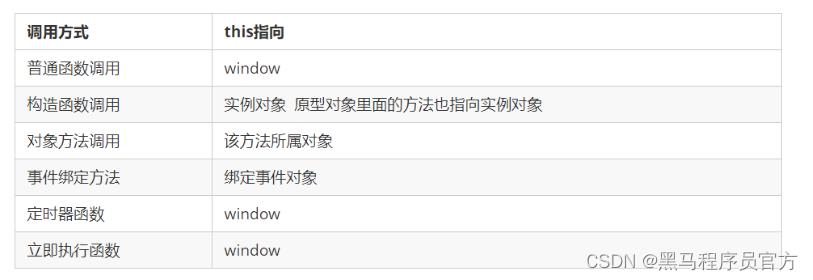改变函数内部 this 指向丨JavaScript 函数进阶
Posted 黑马程序员官方
tags:
篇首语:本文由小常识网(cha138.com)小编为大家整理,主要介绍了改变函数内部 this 指向丨JavaScript 函数进阶相关的知识,希望对你有一定的参考价值。
这些 this 的指向,是当我们调用函数的时候确定的。 调用方式的不同决定了this 的指向不同 一般指向我们的调用者.

<!DOCTYPE html>
<html lang="en">
<head>
<meta charset="UTF-8">
<meta name="viewport" content="width=device-width, initial-scale=1.0">
<meta http-equiv="X-UA-Compatible" content="ie=edge">
<title>Document</title>
</head>
<body>
<button>点击</button>
<script>
// 函数的不同调用方式决定了this 的指向不同
// 1. 普通函数 this 指向window
function fn()
console.log('普通函数的this' + this);
window.fn();
// 2. 对象的方法 this指向的是对象 o
var o =
sayHi: function()
console.log('对象方法的this:' + this);
o.sayHi();
// 3. 构造函数 this 指向 ldh 这个实例对象 原型对象里面的this 指向的也是 ldh这个实例对象
function Star() ;
Star.prototype.sing = function()
var ldh = new Star();
// 4. 绑定事件函数 this 指向的是函数的调用者 btn这个按钮对象
var btn = document.querySelector('button');
btn.onclick = function()
console.log('绑定时间函数的this:' + this);
;
// 5. 定时器函数 this 指向的也是window
window.setTimeout(function()
console.log('定时器的this:' + this);
, 1000);
// 6. 立即执行函数 this还是指向window
(function()
console.log('立即执行函数的this' + this);
)();
</script>
</body>
</html>javascript 为我们专门提供了一些函数方法来帮我们更优雅的处理函数内部 this 的指向问题,常用的有 bind()、 call()、apply() 三种方法。
1. call 方法
call() 方法调用一个对象。简单理解为调用函数的方式,但是它可以改变函数的 this 指向。

- thisArg:在 fun 函数运行时指定的 this 值
- arg1,arg2:传递的其他参数
- 返回值就是函数的返回值,因为它就是调用函数
- 因此当我们想改变 this 指向,同时想调用这个函数的时候,可以使用 call,比如继承
<!DOCTYPE html>
<html lang="en">
<head>
<meta charset="UTF-8">
<meta name="viewport" content="width=device-width, initial-scale=1.0">
<meta http-equiv="X-UA-Compatible" content="ie=edge">
<title>Document</title>
</head>
<body>
<script>
// 改变函数内this指向 js提供了三种方法 call() apply() bind()
// 1. call()
var o =
name: 'andy'
function fn(a, b)
console.log(this);
console.log(a + b);
;
fn.call(o, 1, 2);
// call 第一个可以调用函数 第二个可以改变函数内的this 指向
// call 的主要作用可以实现继承
function Father(uname, age, sex)
this.uname = uname;
this.age = age;
this.sex = sex;
function Son(uname, age, sex)
Father.call(this, uname, age, sex);
var son = new Son('刘德华', 18, '男');
console.log(son);
</script>
</body>
</html>2. apply 方法
apply() 方法调用一个函数。简单理解为调用函数的方式,但是它可以改变函数的 this 指向。

- thisArg:在fun函数运行时指定的 this 值
- argsArray:传递的值,必须包含在数组里面
- 返回值就是函数的返回值,因为它就是调用函数
- 因此 apply 主要跟数组有关系,比如使用 Math.max() 求数组的最大值
<!DOCTYPE html>
<html lang="en">
<head>
<meta charset="UTF-8">
<meta name="viewport" content="width=device-width, initial-scale=1.0">
<meta http-equiv="X-UA-Compatible" content="ie=edge">
<title>Document</title>
</head>
<body>
<script>
// 改变函数内this指向 js提供了三种方法 call() apply() bind()
// 2. apply() 应用 运用的意思
var o =
name: 'andy'
;
function fn(arr)
console.log(this);
console.log(arr); // 'pink'
;
fn.apply(o, ['pink']);
// 1. 也是调用函数 第二个可以改变函数内部的this指向
// 2. 但是他的参数必须是数组(伪数组)
// 3. apply 的主要应用 比如说我们可以利用 apply 借助于数学内置对象求数组最大值
// Math.max();
var arr = [1, 66, 3, 99, 4];
var arr1 = ['red', 'pink'];
// var max = Math.max.apply(null, arr);
var max = Math.max.apply(Math, arr);
var min = Math.min.apply(Math, arr);
console.log(max, min);
</script>
</body>
</html>3. bind 方法
bind() 方法不会调用函数。但是能改变函数内部this 指向

- thisArg:在 fun 函数运行时指定的 this 值
- arg1,arg2:传递的其他参数
- 返回由指定的 this 值和初始化参数改造的原函数拷贝
- 因此当我们只是想改变 this 指向,并且不想调用这个函数的时候,可以使用 bind
<!DOCTYPE html>
<html lang="en">
<head>
<meta charset="UTF-8">
<meta name="viewport" content="width=device-width, initial-scale=1.0">
<meta http-equiv="X-UA-Compatible" content="ie=edge">
<title>Document</title>
</head>
<body>
<button>点击</button>
<button>点击</button>
<button>点击</button>
<script>
// 改变函数内this指向 js提供了三种方法 call() apply() bind()
// 3. bind() 绑定 捆绑的意思
var o =
name: 'andy'
;
function fn(a, b)
console.log(this);
console.log(a + b);
;
var f = fn.bind(o, 1, 2);
f();
// 1. 不会调用原来的函数 可以改变原来函数内部的this 指向
// 2. 返回的是原函数改变this之后产生的新函数
// 3. 如果有的函数我们不需要立即调用,但是又想改变这个函数内部的this指向此时用bind
// 4. 我们有一个按钮,当我们点击了之后,就禁用这个按钮,3秒钟之后开启这个按钮
// var btn1 = document.querySelector('button');
// btn1.onclick = function()
// this.disabled = true; // 这个this 指向的是 btn 这个按钮
// // var that = this;
// setTimeout(function()
// // that.disabled = false; // 定时器函数里面的this 指向的是window
// this.disabled = false; // 此时定时器函数里面的this 指向的是btn
// .bind(this), 3000); // 这个this 指向的是btn 这个对象
//
var btns = document.querySelectorAll('button');
for (var i = 0; i < btns.length; i++)
btns[i].onclick = function()
this.disabled = true;
setTimeout(function()
this.disabled = false;
.bind(this), 2000);
</script>
</body>
</html>call apply bind 总结
相同点:
都可以改变函数内部的this指向.
区别点:
1. call 和 apply 会调用函数, 并且改变函数内部this指向.
2. call 和 apply 传递的参数不一样, call 传递参数 aru1, aru2..形式 apply 必须数组形式[arg]
3. bind 不会调用函数, 可以改变函数内部this指向.
主要应用场景:
1. call 经常做继承.
2. apply 经常跟数组有关系. 比如借助于数学对象实现数组最大值最小值
3. bind 不调用函数,但是还想改变this指向. 比如改变定时器内部的this指向
更多JavaScript内容:
| 黑马程序员JavaScript全套教程,Web前端必学的JS入门教程,零基础JavaScript入门 |
黑马前端专栏干货多多,关注再学,好方便~
2023年前端学习路线图:课程、源码、笔记,技术栈另外此线路图实时更新!需要课后资料的友友们,可以直接告诉我喔~

以上是关于改变函数内部 this 指向丨JavaScript 函数进阶的主要内容,如果未能解决你的问题,请参考以下文章